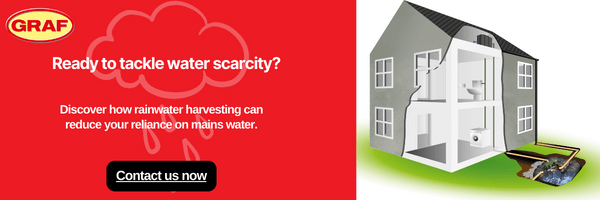Read time - 4 minutes
Europe's Water Crisis: A Looming Threat to the Continent
Water scarcity and drought have become critical issues across Europe, with severe consequences for ecosystems, agriculture, energy production, and daily life. The European Drought Observatory reports that more than a third of the continent is currently under a drought warning, and 10% is experiencing severe drought. Climate change and rising temperatures have made this worrying trend worse, so it needs urgent attention. In this blog post, we will explore the implications of Europe's water crisis, from dwindling rivers to food production challenges, and highlight the importance of sustainable water management for the future.
Rising Temperatures and Depleting Water Sources
Europe's changing climate has led to the loss of crucial water sources. Increasing temperatures cause accelerated snowmelt, leading to reduced snowpack and subsequently dwindling rivers and canals. This phenomenon, coupled with recurring punishing droughts, poses a significant threat to water availability.
Groundwater, the region's essential water reserve, is being depleted faster than it can be replenished by rainfall. The cumulative water loss across Europe is estimated at a staggering 84 billion tonnes per year.
Water Mismanagement and Overconsumption
Water mismanagement exacerbates the crisis. EurEau, the European federation of national drinking water service providers, estimates that approximately 20-25% of drinking water is lost due to leaky pipes. Illegal water use and overconsumption compound the problem and as global temperatures rise, water consumption is expected to increase. England and Wales alone currently utilise around 14 billion litres of water per day, and the National Audit Office predicts that an additional 4 billion litres will be needed daily by 2050 to combat the growing risk of drought.
Climate Change as a Contributing Factor
Climate change plays a significant role in Europe's water crisis. While certain regions have historically experienced natural drought cycles, climate change amplifies the severity and frequency of such events. Higher temperatures accelerate evaporation from the ground, rivers, and lakes, leading to reduced water availability. Climate change intensifies extreme weather events such as heatwaves, prolonging their duration and making them more frequent. This phenomenon bakes the ground, hindering water absorption and increasing the risk of flash flooding.
Glacial Retreat and Impacts on Water Sources
Europe's glaciers are rapidly shrinking due to climate change, depriving major rivers and reservoirs of replenishment. For instance, the Rhine River in Germany hit record lows during the hottest summer ever recorded in Europe in 2022, rendering it impassable for cargo ships. The loss of glaciers not only affects water availability but also disrupts the delicate balance of ecosystems and habitats that rely on a consistent water supply.
Consequences and Impacts
The consequences of Europe's water crisis are far-reaching. Agriculture faces significant challenges, with farmers in Spain warning of crop failures and irreversible losses, especially among cereal growers. Dry ground and vegetation increase the risk of devastating wildfires, as observed in Spain, Portugal, and France in recent years. Ecosystems, including rivers and wetlands, suffer immensely without sufficient water, affecting fish and bird life. Energy security is also compromised, as seen when Norway experienced reduced hydropower production due to low rainfall and France had to reduce nuclear power output due to inadequate river water for cooling. In addition to this the Alps received less than half of their typical snowfall last winter, and Venice's canals will run dry in 2023, both of which show how reduced rainfall and snowfall can have a negative impact on tourism.
Europe's water crisis poses a severe threat to the continent's ecosystems, agriculture, energy production, and overall well-being. Climate change, coupled with water mismanagement and overconsumption, has created an urgent need for sustainable water management practices. Preserving and efficiently utilising water resources, repairing leaky infrastructure, implementing water conservation measures, and promoting responsible consumption are crucial steps towards mitigating the crisis. The collective efforts of governments, communities, and individuals are necessary to ensure the availability of this precious resource for generations to come. By acknowledging and addressing the severity of the situation, Europe can work towards a sustainable and water-secure future.
To find out how you can make a difference explore our tips and tricks in our water saving blog, to see how you can reduce water consumption in your daily life.

Callum Vallance-Poole
+44 (0) 1295 675 493


